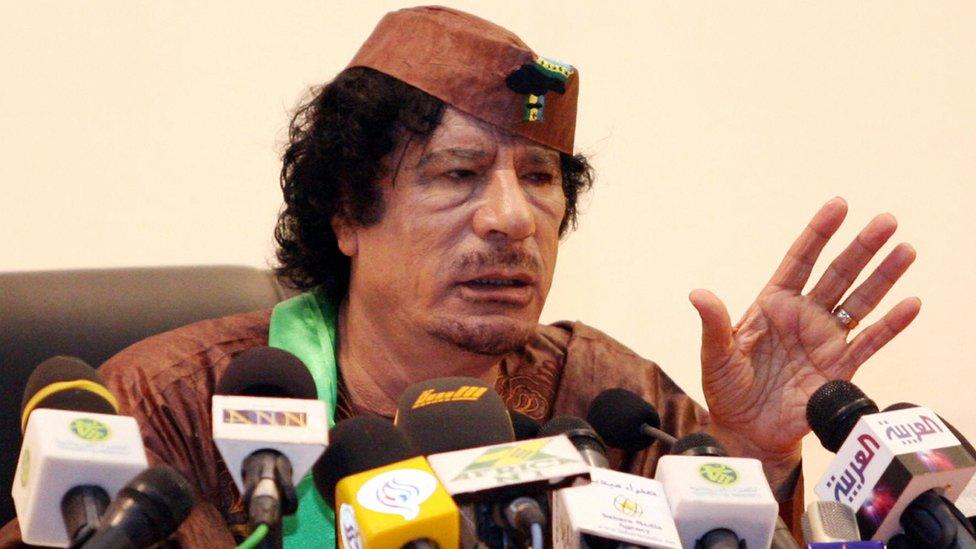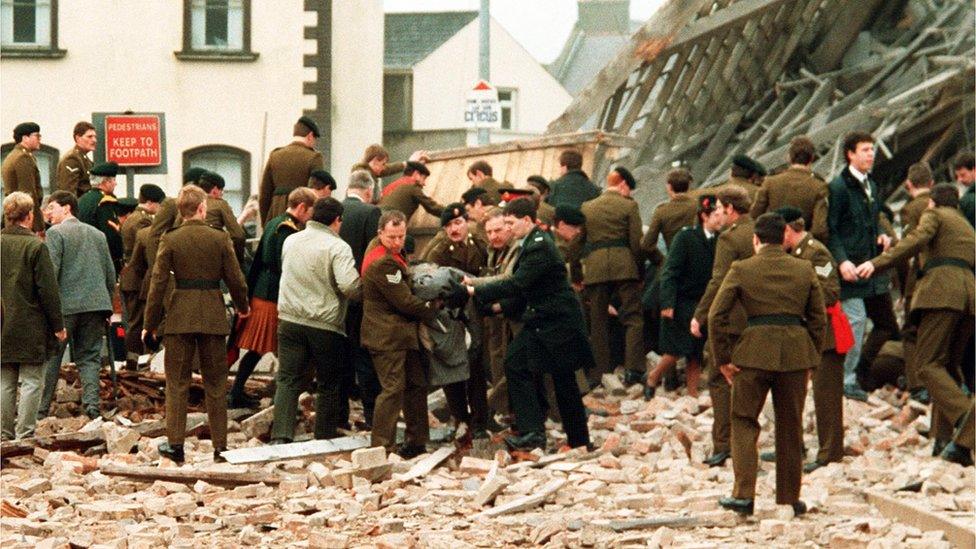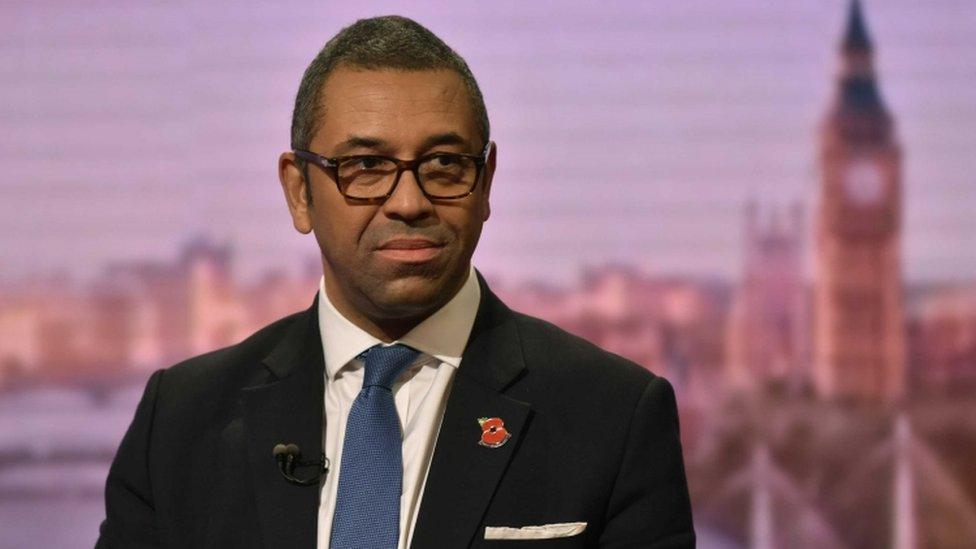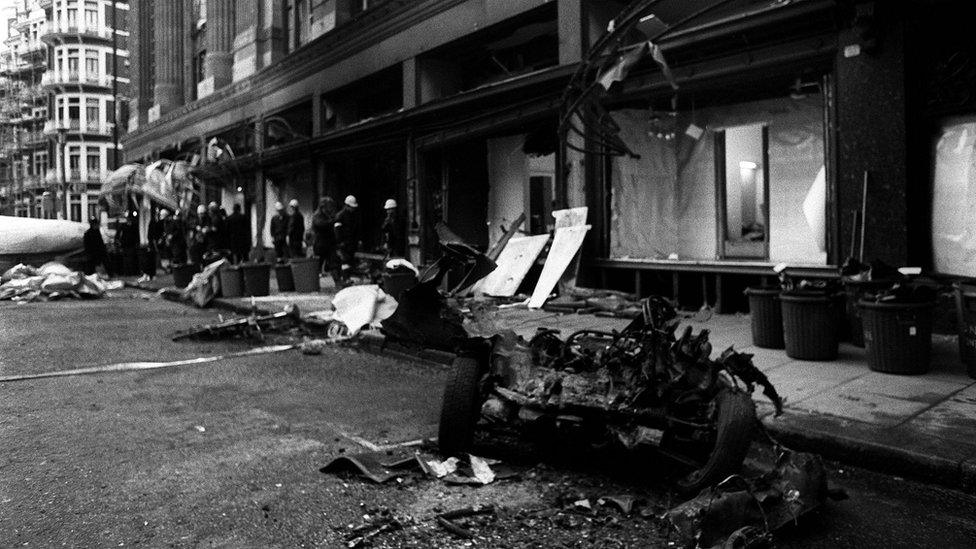Frozen Libyan assets will not be used to compensate IRA victims
- Published

Muammar Gaddafi supplied weapons, including Semtex explosives, to the IRA during the Troubles
The UK government has ruled out using frozen Libyan assets to compensate IRA victims injured by weapons and Semtex supplied by the north African country.
It has also rejected calls to publish a report examining options to compensate victims which was completed last year.
The report's author, William Shawcross, has been summoned to appear before the NI Affairs Committee on Wednesday.
It is part of an inquiry into compensation for victims of Libyan-sponsored IRA attacks.
Former Libyan leader Muammar Gaddafi's regime supplied large amounts of weapons to the IRA during the Troubles.
Its Semtex explosives were used in numerous murders, such as the Enniskillen Remembrance Day bombing in 1987 and the 1996 attack in London's Docklands.
In a written statement to parliament on Tuesday, Minister for the Middle East and North Africa James Cleverly said the "internal scoping report" was commissioned to provide advice to ministers and draws on "private and confidential conversations".

Libyan Semtex was used in the Remembrance Sunday bombing in Enniskillen
He confirmed the report would not be published, but he did set out some of its findings.
These included why the government is legally unable to access £12bn in frozen Libyan assets to compensate the victims.
Mr Cleverly said the "frozen assets may not be seized by the UK government".
He also ruled out using public funds to pay compensation to victims and then recouping the money from the Libyan government.
He said the responsibility for providing compensation lies with the Libyan state and the government had urged the authorities at the "highest level" to engage with UK victims.
But Mr Cleverly added there were "clear practical difficulties in obtaining" compensation from Libya because of the ongoing political and economic instability.
He suggested victims should avail of the current injury compensation schemes in the UK and he also pointed to the Troubles victims pension, which may provide another avenue for compensation.

James Cleverly said the frozen assets could not be seized by the government
DUP deputy leader Nigel Dodds accused the government of "behaving disgracefully" and letting down victims of IRA terrorism.
"In 2004, Libya agreed to pay $1m compensation to the families of each of the 170 people killed in the bombing of UTA flight 772 in 1989," he said.
"The German government secured $35m for those killed in the 1986 bombing of the La Belle discotheque in Berlin.
"After all these years, our citizens have received little more than warm words and sympathy.
"This should be a point of embarrassment for the government. We will be challenging the government further on this matter in Parliament."
Simon Hoare, the chairman of the Northern Ireland Affairs Committee, said the government's announcement would be a "bitter blow to those who have waited so long for recognition and justice and who were urged to put all of their hopes and dreams into Mr Shawcross' appointment".
"In my opinion this important issue has never been treated with the seriousness and urgency it deserves," he said.
"The Northern Ireland Affairs Committee refused to let this issue disappear; we will continue our vigilance on behalf of those people who now need it more than ever."
Kenny Donaldson, of Innocent Victims United, said: "For two years the UK government has been responsible for heaping further pain upon those already treated so shamefully.
"The Shawcross Report can't even be described as a 'whitewash' because it continues to be held back from victims, the full contents remain hidden."
Solicitor Barry O'Donnell, who represents some of the victims, added: "It would appear that today's ministerial statement is another piece of political choreography designed to undermine the authority of NI Affairs Committee and to frustrate the hopes and expectations of victims and survivors of Gaddafi-Libyan sponsored IRA terrorism."
Related topics
- Published24 June 2019

- Published21 December 2018
